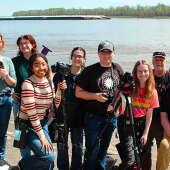More to explore
-
 Editorial (4/15/24)Cape Girardeau Heritage Museum unveils exhibits on old bridge, Truman and American quiltingThe Cape Girardeau Heritage Museum is set to unveil three new exhibits this week that promise to enrich our understanding of both local and national heritage. These exhibits, focusing on the construction of the old Cape Girardeau bridge, President...
Editorial (4/15/24)Cape Girardeau Heritage Museum unveils exhibits on old bridge, Truman and American quiltingThe Cape Girardeau Heritage Museum is set to unveil three new exhibits this week that promise to enrich our understanding of both local and national heritage. These exhibits, focusing on the construction of the old Cape Girardeau bridge, President... -
 Column (4/15/24)The erosion of fiscal responsibilityWashington Post columnist Megan McArdle recently wrote that the best argument made in favor of limiting the size of the stimulus during the Great Recession ó part of a larger conversation about austerity ó was one of ethos. "We werenít spending the...
Column (4/15/24)The erosion of fiscal responsibilityWashington Post columnist Megan McArdle recently wrote that the best argument made in favor of limiting the size of the stimulus during the Great Recession ó part of a larger conversation about austerity ó was one of ethos. "We werenít spending the... -
 Column (4/15/24)We all deserve space to pursue our dreamsThe Erma Bombeck Writersí Workshop saved me from making a huge mistake recently. I emailed my editor before I left and told her that I didnít think Iíd have time to continue writing this weekly column. I told her I was too busy. I have a full-time...
Column (4/15/24)We all deserve space to pursue our dreamsThe Erma Bombeck Writersí Workshop saved me from making a huge mistake recently. I emailed my editor before I left and told her that I didnít think Iíd have time to continue writing this weekly column. I told her I was too busy. I have a full-time... -

-
 Column (4/13/24)Americans are not seeking out middle groundStar ParkerA Wall Street Journal opinion piece by Sen. Mitt Romney regarding the demise of the No Labels political party initiative tells us as much about Romney, and why he failed to ever become a national leader, as it does about the failure of the No Labels...
Column (4/13/24)Americans are not seeking out middle groundStar ParkerA Wall Street Journal opinion piece by Sen. Mitt Romney regarding the demise of the No Labels political party initiative tells us as much about Romney, and why he failed to ever become a national leader, as it does about the failure of the No Labels... -
 Column (4/13/24)Biden Administration not ready for an H5N1 pandemicBetsy McCaugheyThe H5N1 virus, which for 30 years affected mostly birds, is rapidly evolving and spreading globally. The Biden administration is dangerously unready. Over the last two years, H5N1 has jumped from birds to mammals, infecting at least 26 species.
Column (4/13/24)Biden Administration not ready for an H5N1 pandemicBetsy McCaugheyThe H5N1 virus, which for 30 years affected mostly birds, is rapidly evolving and spreading globally. The Biden administration is dangerously unready. Over the last two years, H5N1 has jumped from birds to mammals, infecting at least 26 species. -
 Column (4/13/24)Marjorie Taylor Greeneís case against Speaker JohnsonRich LowryThe first time that Republicans toppled their own speaker during this Congress, it wasnít a particularly edifying spectacle, but Marjorie Taylor Greene is reaching for new lows. To paraphrase Marx: first as a farce, then as a more preposterous...
Column (4/13/24)Marjorie Taylor Greeneís case against Speaker JohnsonRich LowryThe first time that Republicans toppled their own speaker during this Congress, it wasnít a particularly edifying spectacle, but Marjorie Taylor Greene is reaching for new lows. To paraphrase Marx: first as a farce, then as a more preposterous... -
 Column (4/13/24)Eclipse in downtown Cape: A day the hidden gem shown to visitors from around the worldAlyssa Phares-FeeHow do you even begin to describe something thatís both utterly breathtaking and incredibly frustrating all at once? This past weekend was an absolute whirlwind as we played host to folks from all corners ó Washington State, Iowa, St. Louis,...
Column (4/13/24)Eclipse in downtown Cape: A day the hidden gem shown to visitors from around the worldAlyssa Phares-FeeHow do you even begin to describe something thatís both utterly breathtaking and incredibly frustrating all at once? This past weekend was an absolute whirlwind as we played host to folks from all corners ó Washington State, Iowa, St. Louis,... -

-
 Column (4/12/24)The latest sign that Republicans are abandoning even their most deeply held principlesJonah GoldbergThe changing of the conservative mind in recent years could hardly be captured more pithily than in the headline of a recent op-ed: "Why I believe in industrial policy ó done right." So opined Sen. Marco Rubio for the Washington Post and, at greater...
Column (4/12/24)The latest sign that Republicans are abandoning even their most deeply held principlesJonah GoldbergThe changing of the conservative mind in recent years could hardly be captured more pithily than in the headline of a recent op-ed: "Why I believe in industrial policy ó done right." So opined Sen. Marco Rubio for the Washington Post and, at greater... -
 Letter (4/11/24)Overcoming Missouriís opioid epidemicT. Robin Cole IIIBad news: Missouriís opioid epidemic emerged as our most serious public health problem with drug overdose Missouriís no. 1 leading cause of death among adults aged 18-44. Overcoming this crisis will be difficult, yet not insurmountable. Accidental...
Letter (4/11/24)Overcoming Missouriís opioid epidemicT. Robin Cole IIIBad news: Missouriís opioid epidemic emerged as our most serious public health problem with drug overdose Missouriís no. 1 leading cause of death among adults aged 18-44. Overcoming this crisis will be difficult, yet not insurmountable. Accidental... -
 Column (4/10/24)Yes, fight anti-white racismRich LowryIs there anything more poisonous or ridiculous than insisting that corporations and the government treat people fairly regardless of race? Apparently not. An Axios report on the Trump teamís intention to use civil-rights laws to target diversity,...
Column (4/10/24)Yes, fight anti-white racismRich LowryIs there anything more poisonous or ridiculous than insisting that corporations and the government treat people fairly regardless of race? Apparently not. An Axios report on the Trump teamís intention to use civil-rights laws to target diversity,... -
 Editorial (4/10/24)Nominations open for Difference Makers 2024Many people who work to improve lives, communities and societies have one thing in common: They donít do what they do for a pat on the back. Instead of looking for a congratulatory spotlight, they are heads-down, shoulder-to-the-wheel helping...
Editorial (4/10/24)Nominations open for Difference Makers 2024Many people who work to improve lives, communities and societies have one thing in common: They donít do what they do for a pat on the back. Instead of looking for a congratulatory spotlight, they are heads-down, shoulder-to-the-wheel helping... -
 Letter (4/9/24)From local meetings to DNCChuck BanksThe presidential primary went well. The next step will be the local county mass meetings. Each county will elect delegates to go to the congressional meetings. The eighth congressional meeting will be held in Wayne County this cycle. Thatís the only...
Letter (4/9/24)From local meetings to DNCChuck BanksThe presidential primary went well. The next step will be the local county mass meetings. Each county will elect delegates to go to the congressional meetings. The eighth congressional meeting will be held in Wayne County this cycle. Thatís the only... -

-
 Editorial (4/8/24)Cape Chamber celebrates local innovators at annual dinnerThe Cape Girardeau Area Chamber of Commerceís annual dinner is always an inspiring evening recognizing the achievements of business innovators in our region who are leading industries, championing new ideas, and taking leadership roles that propel...
Editorial (4/8/24)Cape Chamber celebrates local innovators at annual dinnerThe Cape Girardeau Area Chamber of Commerceís annual dinner is always an inspiring evening recognizing the achievements of business innovators in our region who are leading industries, championing new ideas, and taking leadership roles that propel... -
 Editorial (4/4/24)Solar eclipse 2024 is on the horizonA solar eclipse will bring four minutes of midday darkness to Southeast Missouri on Monday, April 8. This celestial oddity is revisting the region only seven years after its last appearance, though another wonít reveal itself until Aug. 12, 2045....
Editorial (4/4/24)Solar eclipse 2024 is on the horizonA solar eclipse will bring four minutes of midday darkness to Southeast Missouri on Monday, April 8. This celestial oddity is revisting the region only seven years after its last appearance, though another wonít reveal itself until Aug. 12, 2045.... -

-
 Editorial (4/3/24)Adult and Teen Challenge Mid-America banquet set this monthHave a good meal. Enjoy fellowship with friends and neighbors. Maybe go home with a football helmet signed by Kansas City Chiefs quarterback Patrick Mahomes. And help support a menís substance abuse recovery program at the same time. Adult and...
Editorial (4/3/24)Adult and Teen Challenge Mid-America banquet set this monthHave a good meal. Enjoy fellowship with friends and neighbors. Maybe go home with a football helmet signed by Kansas City Chiefs quarterback Patrick Mahomes. And help support a menís substance abuse recovery program at the same time. Adult and... -
 Editorial (4/1/24)Old Town Cape recognizes those making difference in downtownThe Old Town Cape annual dinner recently celebrated the remarkable individuals and organizations whose contributions have significantly impacted the revitalization and enrichment of Old Town. Their contributions have catalyzed remarkable...
Editorial (4/1/24)Old Town Cape recognizes those making difference in downtownThe Old Town Cape annual dinner recently celebrated the remarkable individuals and organizations whose contributions have significantly impacted the revitalization and enrichment of Old Town. Their contributions have catalyzed remarkable... -

-

-

-
 Editorial (3/29/24)May this Easter bring you the hope and joy of Jesus' resurrectionMay this Easter bring you the hope and joy of Jesus' resurrection "On the first day of the week, very early in the morning, the women took the spices they had prepared and went to the tomb. They found the stone rolled away from the tomb, but when...
Editorial (3/29/24)May this Easter bring you the hope and joy of Jesus' resurrectionMay this Easter bring you the hope and joy of Jesus' resurrection "On the first day of the week, very early in the morning, the women took the spices they had prepared and went to the tomb. They found the stone rolled away from the tomb, but when... -
 Editorial (3/27/24)Tuesday is election day; important issues at stakeTuesday, April 2, is election day for municipalities and school districts. Voters will select city council and school board members and decide a number of tax proposals. In Cape Girardeau, Scott and Perry counties, measures to provide funds for...
Editorial (3/27/24)Tuesday is election day; important issues at stakeTuesday, April 2, is election day for municipalities and school districts. Voters will select city council and school board members and decide a number of tax proposals. In Cape Girardeau, Scott and Perry counties, measures to provide funds for... -

-

-
 Editorial (3/25/24)Otto Porter Jr. set the standard for basketball in this areaOtto Porter Jr. is arguably the best basketball player to come out of Southeast Missouri. Standing 6 feet, 8 inches tall, the Scott County Central alum dominated courts throughout the region as a high school player. We remember his masterful...
Editorial (3/25/24)Otto Porter Jr. set the standard for basketball in this areaOtto Porter Jr. is arguably the best basketball player to come out of Southeast Missouri. Standing 6 feet, 8 inches tall, the Scott County Central alum dominated courts throughout the region as a high school player. We remember his masterful... -

-


Respond to this story
Posting a comment requires a subscription.